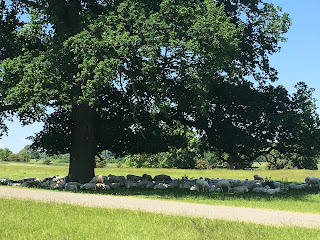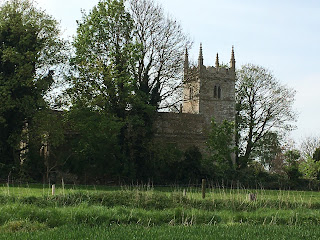ON TIPTOE
As I drive down the steep little hill to park outside Launde Abbey a cassocked figure, possibly the deputy warden or chaplain, is shoo-ing a small herd of heifers away from the parking spaces. He explains, though I’d guessed, that on a hot day the cows are looking for shade and don’t like sharing space under the adjacent tree with the sheep. (Better together, boys and girls!) Perhaps I’d like to consider parking my car in the open, where they won’t want to be? I decline, and then soon afterwards - but too late - question the wisdom of my decision. After all, he knows his local animals, and I don’t. He’s a very competent shoo-er -not in the average clergyperson’s job spec. Though herding cats may be.
It's
up and down all the way to Tilton on the Hill. Sweet-scented and shimmering in
the midsummer sun, the countryside here makes me think of rural Devon or
Somerset away from the moorlands. I follow the narrow lane between the broad
top of Robin-a-Tiptoe hill, Whatborough Hill with its telecoms mast, and the
cone of Colborough Hill (all of them relative Leicestershire mountains at over
200 metres) before joining the Oakham Road. Here there is more traffic, and
more frequent verge-leaping to be done. In 1941 a Wellington bomber crashed on
Whatborough returning from a mission over Boulogne. Five of the six on board
were killed. The two pilots were 23 and 19 years old respectively. One of the
crew who was a few years older than the others survived but died two years
later from polio. Just now, in the light of the war in Ukraine, I read these
kinds of stories slightly differently. There are sheep clearly visible on the
top of Robin-a-Tiptoe, and the vegetation is a darker, more heathland colour
because of an ancient enclosure which over the ages people have variously
interpreted as Danish or Roman. The sheep are significant. The hill’s original
name was ‘Howback’, but it now takes its name from a sheep rustler who
was rescued from hanging because he was too tall. His accusers couldn’t find a
branch high enough, so on ‘tiptoe’ he was still able to touch the ground.
As for Whatborough…
Clearance
Were we born to despise
colour, wealth or race?
What is it veils our
eyes?
What truths do we not
face?
If bad conscience is
wiped clear
No crime is disallowed.
We silence what we fear
We cloak ourselves in
cloud.
We nudge
We compel
We move
We rend
We force
We expel
We hate
We ‘cleanse’
The history of the
world
Is all contained in
this
The ‘good’ a foetus
curled;
Ought misconstrued as is.
I still believe in moral progress, but these days only just. It seems old habits die hard. The regression to oppression is always with us. The above stanzas were a reaction to the medieval clearance which occurred at Whatborough, a political act depriving the poor, further enriching the powerful, the church authorities at very least passive in what was done, if not actually colluding. It was a pattern repeated the length and breadth of Britain. And so, in different ways, in different places, it continues…the Palestinians, the Rohingya, Rwanda (and I’m thinking of its internal difficulties not our possible mis-use of it) and so on, with much of this activity fuelled by prejudices we should recognise in ourselves. And unfettered, would our current political leaders act differently, given the evidence we have before us?
For Christians, Paul’s painful self-examination: ‘Why do I do the things I hate, and fail to do what I know I should?’ is a daily experience. This analysis means nothing to most people.
I
pass through Halstead after a lung-challenging climb and use the tradesman’s
entrance to arrive in Tilton via a scrubby path. It’s coffee n’chat at St.
Peter’s, as it is every Friday morning, but because I arrive a couple of
minutes before midday I’ve missed most of it. I hear good humour shared and
sound advice administered as I sit and take in the monuments, the broad nave,
and the apparently slightly offset chancel.
Jim talks to me about the Digby family, whose name is still writ large
in local cartography. I encountered traces of their forebear Sir Everard at
Stoke Dry a few years ago, a man implicated in gunpowder, treason and plot, and
executed for it. (I’m not a lover of camp wit, but it’s hard to hear the name Everard
without thinking of Larry Grayson’s fictional friend who loved dancing the Gay
Gordons). Sir Everard’s son Kenelm, who Jim now mentions to me, is a man
worthy of an entire saga to himself. Please look him up, to see if you agree.
On the hill
I could make a pun,
like,
‘Tilton at windmills’
but doubtless it’s been
done before.
A mason once had fun,
carving
‘mooning men’
gargoyles;
then was shown St.
Peter’s door.
Children in the sun at
the
‘Tiddlywinks’ school;
A whole new world to
explore!
Legends Tiptoe in the
high Leicester hills
and from what I know
it’s sure;
each village, every
one, has its
own close secrets.
So tell me more…
Tell me more!
Before arriving in Rutland, I didn’t realise how distinct and how jealously guarded the characters of individual villages are. I should have understood this. I once heard it said that in Manchester, the individual suburbs of the contemporary city each had their own dialect which made the speaker’s origin instantly identifiable. I subsequently asked a Mancunian singer of roughly my own age if this was true, and he confirmed it, even from his own childhood and teenage years in the fifties and sixties. This has consequences for rural ministry. We cannot by fiat assimilate different villages and expect anything other than rejection, at least in the short term. They are themselves and they don’t necessarily want to become something else.
I walk back to Launde round the other side of the hills, following the line of the disused railway for some of the distance to Oxey Farm. It is now a very quiet area, to which not even the caravaners have found their way this June. Perhaps when the trains were still chugging their way through the deep cuttings, one felt closer to civilisation than one does now, though I suppose the number of trains per day wasn’t very great on this backwater of the Great Central (?)
At Launde the car is a lot muddier than it was than when I left it. From the marks on the bodywork, I suspect it’s made close acquaintance with bovine backsides and slobbering mouths. The guilty cattle are nowhere to be seen, having been seen off from the tree’s shade by the sheep, somehow.
15 km. 4 hrs. 24 deg.
C. Clear blue and sunny all the way.
Launde – Tilton – Launde.
It should have been the festival of Barnabas last Sunday, but he was slipped to Monday instead, perhaps deemed unworthy of consideration on the Sabbath.
Another sometime walker
Barnabas.
Now there was a guy.
An encourager
No pushover
Up for a scrap
if he thought it was
right.
Loyal to a fault.
Took on Paul;
Said the lad Mark
deserved a second
chance.
Paul intransigent,
Was having none of it.
A hook was slung;
Barnabas treading a
different path
Still stayed close.
Frustrating not to know
How he was called
and where
and what came next.
Just think…
if he’d
put pen to paper
(not the other man!)
What then might have
been?






Comments
Post a Comment